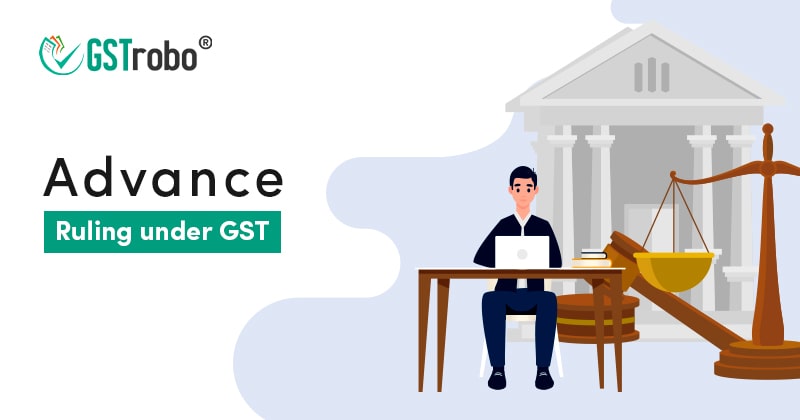Advance Ruling under GST
The Goods and Services Tax (GST) is an indirect tax levied on the provision of goods, services, or both. In other words, GST is a consumption and destination-based tax. This tax is levied and collected for the consideration of goods or services supplied. The GST notion necessitates a plethora of topics that need to be discussed. One of them is the notion of Advance Rule. The concept of Advance Rule exists under Goods and Services Tax, as it did under the previous VAT regime. Let’s take a birds-eye look at its functions below:

What is an Advance Ruling under GST?
Advance Ruling under GST means a decision provided by the Authority or the Appellate Authority to an applicant on a matter or questions relating to
- Applicability of a notification issued under the provisions of this Act;
- Determination of the liability to pay tax on any goods or services or both
- Whether the applicant is required to be registered;
- Whether any particular thing done by the applicant with respect to any goods or services or both amounts to or results in a supply of goods or services or both, within the meaning of that term.
Who is eligible to apply for Advance Rule?
Any applicant registered under the GST Act who wishes to seek an Advance Ruling may do so by submitting FORM GST-ARA-01 together with appropriate documents. It should be further noted that these documents must be signed by the applicant and accompanied by a fee to be deposited.
Is a Person’s Hearing Granted?
No application shall be refused unless the applicant is given a personal hearing chance. Within ninety days of receipt of the application, the Authority shall issue such order in writing as he deems appropriate, confirming or amending the judgment appealed against. Suppose there is a difference of opinion among the members after the judgment is issued. In that case, it must be submitted in writing and sent to the Appellate Authority for hearing and decision. Any member of the Authority of Advance Ruling will certify that the copy of the advance ruling is a genuine copy of the original.
If a mistake is discovered, that increases the tax burden or reduces the amount of input tax credit. In that case, a chance for a personal hearing is to be provided.
Is the Order Issued by the Authorities Final or It can be Appealed Further?
An applicant may file an appeal against an Advance Decision on the common portal in FORM GST- ARA-02, within the thirty-day period in which the ruling is sought, and for a further extended term not exceeding thirty days, along with a fee to be submitted. In the case of a revenue appeal, the concerned official or officers must apply FORM GST-ARA-03.
Is the authorities’ Order amenable?
The authority and the appellate authority can amend any order passed to rectify any error apparent on the face of the record on his own or notice by the concerned officer, the applicant, or the jurisdictional officer within 6 months of the date of order.
Is the Order Issued by the Authorities Valid Throughout the State?
Unless there is any law or fact on the applicant who purchased the issue for an advance rule, the authorities’ advance ruling will bind the relevant officer or the jurisdictional officer regarding the applicant.
What happens if the Applicant provides inaccurate information?
The ruling will be null and void if it was acquired via fraud, concealment of material facts, misrepresentation of facts, etc. The Act gives the authorities all of the powers of a civil court in advance.
Is there an Appellate Forum under Advance Ruling?
On the Council’s proposal, the government should establish, by notification, a National Appellate Authority for Advance Ruling for considering appeals.
When the appellate authority of two or more states or union territories, or both, issues opposing advance decisions, the appeal is to the National Appellate Authority, etc.
What is the time limit for filing an appeal with the Appellate Forum?
The appeal must be submitted within thirty days of receiving notification of the judgment to be appealed. This can be extended by the National Appellate Authority for up to ninety days if valid grounds are presented by the parties involved.
What are the Appellate Authority’s powers?
The Authorities, Appellate Authority, and National Appellate Authority have all the powers of a civil court for discovery and inspection, oath examination, and production of accounts and other records. The procedures on the aforementioned authority will be judicial.
As a result of the foregoing, we may infer that, under the idea of Advance Rule, the government may nominate any officer not lower than the level of the joint commissioner as a member of the Authority for Advance Ruling. Furthermore, as noted previously, the advance judgment must be issued within ninety days of the application’s receipt. The debate is not thorough and is merely a cursory look. In writing this blog, the author’s goal is to provide a thorough understanding of the Advance Rule concept under GST.
